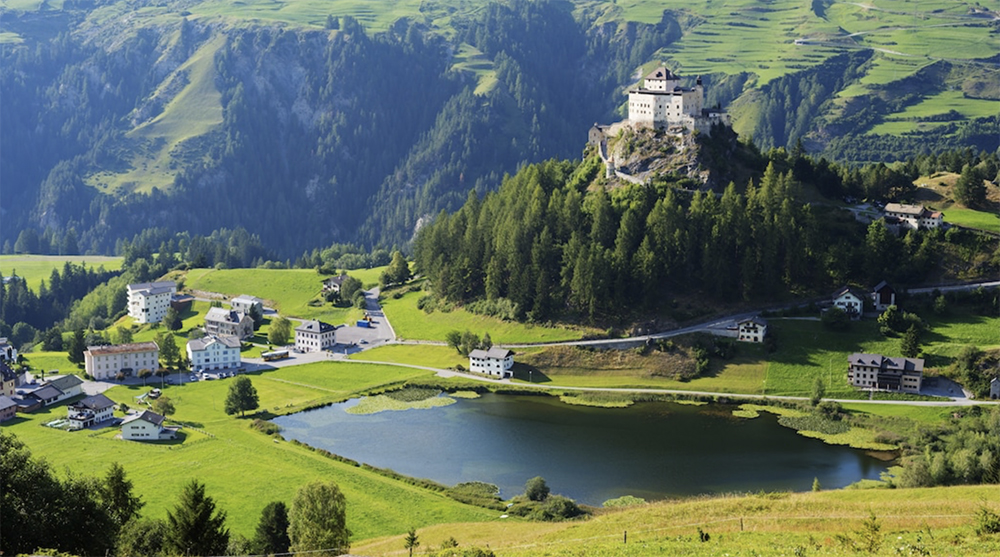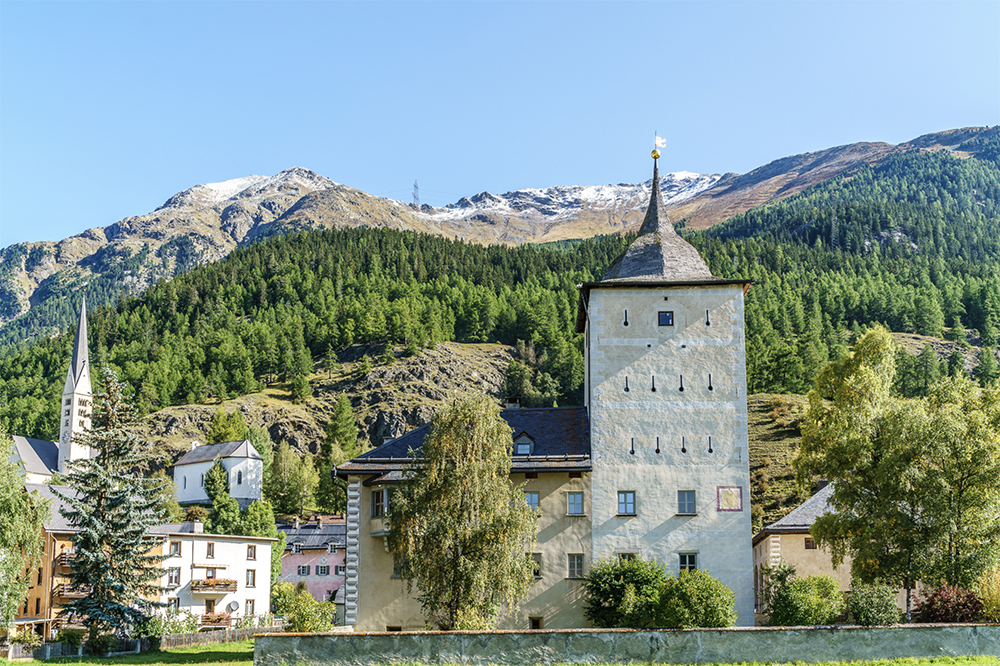My bike race of 2024 was a departure from years past: I tried a new event, the Engadin Radmarathon. The hosting town is Zernez, which is a 45-minute drive from Saint Moritz, in south-east Switzerland. Zernez’s canton – the rough equivalent of a Canadian province or UK county – is known as Graubünden in German, and Grisons, in French.

Zernez in Winter
But I don’t want to write about biking here. I want to write about language.
Languages and Dialects
Anyone who has visited Switzerland knows that many (most?) of the people are linguistic virtuosos.
There are four official languages in Switzerland. The percentage of Swiss who speak them as a first language are as follows: German (62.3%), French (22.8%), Italian (8.0%) and Romansh (0.5%).
In the case of Romansh, you have to give kudos to a country that officially supports a language spoken by such a small percentage of its people. [All four official languages appear on Swiss banknotes, which the Wangs crew will remember was a source of great mirth. “Dieci Franchi”, however, is Italian, not Romansh.]
These languages sub-divide into no fewer than 10 vernacular dialects, such as High- and Swiss-German, different versions of French, and so on. Of the immigrant population in Switzerland, five other languages (English, Portuguese, Albanian, Serbo-Croatian and Spanish) are spoken more than Romansh. I wasn’t able to find any data on the percentage of multilingual speakers in Switzerland.
But I sure found a lot of those multilingual speakers in Zernez.
Romansh
On the basis of the above stats, you might have thought it unlikely that I should run into very many Romansh speakers; quite the contrary, as Graubünden, the canton in which Zernez resides, is a hotbed of Romansh. And Zernez would seem to be the centre of that hotbed.
From the census of the year 2000, 61.11% of people in Zernez spoke Romansh as a first language, followed by 31.28% German, and 4.38% Italian. The small proportion of the latter is a bit of a surprise, as the Italian border is only a few kilometres away (the second day’s biking competition took us almost immediately into Italy); but then again, beautiful as they are, mountains are great separators.
Neat fact about Romansh: there are at least seven major dialects, and plenty of sub-dialects. The dialects have ridiculous-sounding names and they don’t seem to respect obvious geographic boundaries such as rivers or mountains. It seems, sometimes, that you just need to cross the street to start speaking something else. Some dialects are sufficiently different that if two speakers of each come together for a conversation, rather than strike a compromise, they swap to German, which is nothing much like Romansh. Worse: in the Romansh-based town of Brail, they speak in the Putèr dialect of Romansh, but write in Vallader. It’s nuts!
Sadly (or so it seems to me) Romansh is in decline. In 1980, 70.11% of the Zernez population spoke Romansh as a first language. So between 1980 and 2000, it has fallen back by over 10%.

Tarasp Castle (“Chastè da Tarasp” in Romansh), in nearby Scuol
Trying My German
But back on the ground, everyone, but everyone I met spoke several languages. And they certainly all spoke better English than I spoke German, which started out as a problem, but soon became an advantage.
The reason I say it was a problem is because it had been 20 some-odd years since I had used my German in earnest, and I was very keen to do two things: use it, and observe in myself how that German came back to me after such a long time. Out of politeness – or frustration – many of the local people I spoke with would break quickly into English when they caught me struggling in German (so pretty much from the first word of any sentence I uttered). At the same time, they seemed to understand – and seemed pleased – when I asked if we could continue in German, as I wanted to use it.
The reason I say it was an advantage is every time I ran into a brick wall searching for a key German word, it was like having your own personal, flesh-and-blood Siri in front of you; you could break cover, and ask, “What’s the German word for X”, and get an immediate reply. The conversation would revert to German, and on we’d happily go, as if without interruption.
Fantastisch.
(That one was easy.)
Almost the Right Word
And “X”, in the paragraph above, marks the spot of interest. One of the things I found most intriguing was which words came back to me instantly, and which I had to enquire about. I suppose you would have thought more common words would have come easily, less common ones more likely to have you asking your interlocutor for a translation. But that is not how it turned out.
For example, I walked into a sports shop and an attendant came over to ask if they could help. I wanted to say that I was just “window-shopping”, and the correct German word, “schauen” came instantly to me. That kind of surprised me. It is not an obscure word, but it is somewhat of a particular usage, and I wasn’t tempted to try other, more common German equivalents for “look” or “see”. It was just there, waiting for me when I wanted it.
On the other hand, on the morning of the last day of racing, which was marred by terrible weather, I found myself in the hotel breakfast room at 05:30 with a group of my fellow hotel-guests, trying to decide whether to ride or not. I wanted to say I would wait until 06:00 to take a decision, but the German word for “decision” simply would not come. Why not? It is a common enough word, I must have used it hundreds of times in the past, there were no ambiguous alternatives, and I could have punched myself when the person I was speaking with told me “Entscheidung” was the word I was after.
(In the end, the biking decision was academic, as the entire race was cancelled just before the start.)
I had plenty of these strange moments, where an obscure word would arrive right on time, but a common word would escape me. I have no idea why.

The Schloss Planta-Wildenberg. Does anyone know what the upwards-pointing slots are for, in the archers’ windows?
Locking In
One of the reasons I was interested in watching myself adjust to a sudden immersion in German was because of previous experience. Around about 2001, for over a year, I was yo-yoing back and forth between Bellentre in France and Frankfurt in Germany, each trip lasting about two weeks. To be sure, neither French nor German are my mother tongue, so each trip represented a brutal shift from speaking one secondary language to another.
Each time I made the trip, I noticed that for about the first day after arriving, I might reach for a less-than-familiar word, and what would pop up would be the right word, but in the wrong language. And this seems to happen quasi-unconsciously: it would take a few moments for me to notice my mistake.
For example, upon arriving in Frankfurt, I’d be trying to speak German, but a fair number of French words would be peppered – involuntarily – throughout my speech. It seemed this only lasted for about 24 hours each time. After that, I was properly locked-in to the local language. Sure, I might fail to remember a word, but after a day or so, my mind no longer tried to smuggle a French equivalent in its place.
And then two weeks later, I had to go back whence I had come, and I would experience exactly the same phenomenon in France, all over again, but reversed.
I always wondered why, and never thought of an answer. But just now, in writing this paragraph, I’ve come up with a theory. I am not so sure it is correct, but it rings somewhat true for me.
I wonder if the problem occurs because for the first little while, I am not really locked in to the local language, rather am speaking “a foreign language”; when I reach for a word in the local language, I cannot remember it in time, but I can remember the correct word in my other secondary language. It’s good enough for some linguistic editing centre in my mind, and it therefore passes. This might explain why English words rarely intrude in the same way when I am speaking one of my secondary languages.
So imagine I am in Frankfurt, and want to say “I made a mistake. The German word I am after is “Fehler”, but if it doesn’t arrive in time, the flummoxed linguistic centre of my brain, due to a kind of variation of what Daniel Kahneman called “availability bias” proffers the French word “erreur” instead.
Okay, it is not strictly speaking the right word; but 500km to the south, as the crow flies, it would be….
Suddenly I find myself wanting to return to travelling frequently between Bellentre and Frankfurt, just to test this out.
A nice thought: it certainly would also be good to see Shlomo again.
Leaning Into It…
But to close…
A corollary to the language issue is of course accents, and with it, pronunciation.
While driving there, I had said to myself, “Brad, if you are going to spend four days in Zernez, you at least need to pronounce the place-name properly.” So during the first evening in the hotel restaurant, I started talking with the waitress, and finally, in German — as German seemed to be the language that worked best for both of us — asked…
“How do you pronounce ‘Zernez’”.
Her reply was comprehensive and confident. She said that it depended upon where you came from and what language you were speaking. So if you were a speaker of High German, you’d say X (I confess I forgot the nuances of the pronunciations pretty quickly) whereas a Swiss-German would say Y. A French speaker would soften the trailing “z”. Italian had its own twist. Finally, a Romansh speaker would say something else. Romansh seemed to be the pronunciation that required the most gusto.
She really leant into it….
My German is pretty poor, and I am abysmal at recognising German accents. But towards the end of the conversation, I got around to the question,
“And you? Which is your mother tongue?”
From her pronunciation lecture, I was guessing she’d say Romansh.
Her reply:
“Me!? I’m from Portugal!”
